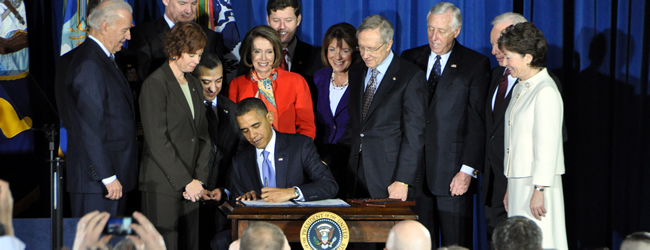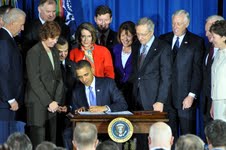National
HISTORIC: Obama signs ‘Don’t Ask’ repeal
Implementation process for open service must follow

The long fight to end a 17-year-old law barring open gays from serving in the U.S. military culminated in a significant milestone on Wednesday when President Obama signed into law a bill allowing for repeal of “Don’t Ask, Don’t Tell.”
Prior to the signing, Obama said the legislation will strengthen national security and “uphold the ideals that our fighting men and women risk their lives to defend.”
“No longer will our country be denied the service of thousands of patriotic Americans who are forced to leave the military, regardless of their skills, no matter their bravery or their zeal, no matter their years of exemplary performance because they happen to be gay,” Obama said.
During his remarks, the president also seemed to address those who have concerns about openly gay and lesbian people serving in the U.S. military to allay worries about the change to come.
“Now, with any change, there’s some apprehension,” Obama said. “That’s natural. But as commander-in-chief, I am certain that we can affect this transition in a way that only strengthens our military readiness; that people will look back on this moment and wonder why it was ever a source of controversy in the first place.”
The president signed the legislation in an auditorium at the Department of Interior before an audience of about 500 invitees that included both gay rights supporters and U.S. lawmakers such as Sens. Kirsten Gillibrand (D-N.Y.) and Mark Udall (D-Colo.) as well as gay Reps. Barney Frank (D-Mass.) and Jared Polis (D-Colo.).
Flanking Obama during the signing were gay former service members — Marine Staff Sgt. Eric Alva and Navy Cmdr. Zoe Dunning — as well as lawmakers who worked to pass the legislation, such as Rep. Patrick Murphy (D-Pa.), Sen. Joseph Lieberman (I-Conn.), House Speaker Nancy Pelosi (D-Calif.), Senate Majority Leader Harry Reid (D-Nev.) and Sen. Susan Collins (R-Maine). Chairman of the Joint Chiefs of Staff Adm. Mike Mullen, who has testified before Congress in favor of open service, was also behind the president during the signing.
When he finished signing the bill, Obama declared, “This is done!” and embraced those who were with him on stage as the audience chanted, “U-S-A! U-S-A!”
Prior to the signing, Vice President Joseph Biden told the audience that the legislative repeal of “Don’t Ask, Don’t Tell” marks the fulfillment of the one of the promises to the LGBT community on which he and Obama campaigned in 2008.
“This fulfills an important campaign promise the president and I made, and many here on this stage made, and many of you have fought for, for a long time, in repealing a policy that actually weakens our national security, diminished our ability to have military readiness, and violates the fundamental American principle of fairness and equality — that exact same set of principles that brave gay men and women will now be able to openly defend around the world,” he said.
President Obama signed the bill after the U.S. Senate on Saturday voted to approve the legislation, 65-31. All Democrats who were present voted in favor of the bill; Sen. Joe Manchin (D-W.Va.) didn’t vote. Eight Republicans voted in favor of the legislation: Collins, Sen. Olympia Snowe (R-Maine), Sen. Scott Brown (R-Mass.), Sen. Lisa Murkowski (R-Alaska), Sen. Mark Kirk (R-Ill.), Sen. George Voinovich (R-Ohio), Sen. John Ensign (R-Nev.) and Richard Burr (R-N.C.).
Gay service members discharged under “Don’t Ask, Don’t Tell” who were present in the audience during the signing told the Washington Blade that the occasion overwhelmed them with joyous feelings.
Stacey Vasquez, an Army paralegal who was discharged under “Don’t Ask, Don’t Tell” in 2003, said she was waiting for the moment “for so many years” and she couldn’t be happier.
“I had moments where I had my doubts of whether we were going to make it or not, but we were on the Hill every single day working on this,” Vasquez said. “People were very responsive to our stories about being discharged and why the law was unfair. It was just a matter of getting past the politics.”
Maj. Margaret Witt, an Air Force service member who last month became the first gay person discharged under “Don’t Ask, Don’t Tell” to be reinstated in the military by court order, said the moment of the bill signing will “go down in history.”
“I’m really happy to be here and hopefully carry the spirit of all those who are out there serving today,” Witt said. “It took years — years and years of really hard work and dedication.”
C. Dixon Osburn, who co-founded Servicemembers Legal Defense Network in 1993, said he was feeling “euphoria” following the bill signing and called the moment “the most significant advance in LGBT equality ever.”
“I think when you reduce it down to its essential — the young man and lesbian is not going to have to call SLDN hiding, quivering, wondering if they’re going to jail or if their career is going to be over the next day,” Osburn said. “America is now going to be with them for the first time, and they can serve with honor and integrity. Multiply that by a million, and that’s the significant change that we have today.”
Even though Obama has signed the legislation, repeal won’t take effect immediately. Language in the bill states that open service won’t be implemented until the president, the defense secretary and the chair of the Joint Chiefs certify that the U.S. military is ready for repeal.
There is no set deadline for when this certification must happen. Defense Secretary Robert Gates has said he wants to first institute training to facilitate open service before issuing certification.
After certification, an additional 60-day waiting period for congressional review must pass before “Don’t Ask, Don’t Tell” is officially off the books and gays can serve openly without fear of discharge.
During his remarks, Obama said he’s spoken with the military service chiefs about implementing the change and expects that it will be done quickly.
“I have spoken to every one of the service chiefs and they are all committed to implementing this change swiftly and efficiently,” Obama said. “We are not going to be dragging our feet to get this done.”
On Wednesday, White House Press Secretary Robert Gibbs said during a news conference that the president believes implementation of repeal of “Don’t Ask, Don’t Tell” would be “a matter of months.”
Aubrey Sarvis, SLDN’s executive director, has been pushing for certification to happen in a matter of weeks so that open service can begin in the first quarter of next year. He added that his organization will be “looking closely” at the new regulations that the Pentagon issues on gays in the military following certification.
“The regulations will be critical,” he said. “We’ll be working closely with [the Defense Department] on that and at SLDN, I think, our key role in 2011 — and probably the following year — will be oversight. Oversight of how the regulations are issued [and] oversight on how they are administrated.”
Even though the president has signed the bill into law, opponents of open service in the military continue to pursue avenues to block “Don’t Ask, Don’t Tell” repeal before it’s implemented.
On Tuesday, Senate Minority Leader Mitch McConnell tried to attach an amendment to the fiscal year 2011 defense authorization bill pending before the Senate to expand the certification responsibilities to include the military service chiefs. Since many of the chiefs have expressed opposition to open service at this time, such a measure could have delayed implementation indefinitely.
However, the amendment was blocked on Tuesday after Sen. Joseph Lieberman (I-Conn.), the sponsor of repeal legislation in the Senate, objected to the measure.
Sarvis said there is “room for mischief” as long as certification is outstanding because opponents of “Don’t Ask, Don’t Tell” repeal could continue to propose similar amendments that would meddle with the process.
“No one should be mistaken that opponents will try to undo this before it gets off the ground,” Sarvis said.
Legislative repeal of “Don’t Ask, Don’t Tell” was one of President Obama’s major promises to the LGBT community, but a number of gay rights supporters say they are expecting more from him during his presidency.
John Aravosis, the gay editor of Americablog, said repeal of “Don’t Ask, Don’t Tell” is but one item crossed off the list and other promises are still outstanding, such as repeal of the Defense of Marriage Act and passage of the Employment Non-Discrimination Act.
“By now, I was expecting ENDA passed and [‘Don’t Ask, Don’t Tell’] repealed, with a promise to get to DOMA soon,” Aravosis said.” We still have to wait until next year to see whether [‘Don’t Ask, Don’t Tell’] is truly and fully repealed, and forget about ENDA and DOMA for years to come. I’m glad the [‘Don’t Ask, Don’t Tell’] legislation passed this weekend, and I’m glad the president finally got engaged. But we are at best getting one of the three big civil rights promises the president made to us, and that’s it for a long time coming.”
Dan Choi, an Iraq war veteran discharged under “Don’t Ask, Don’t Tell” who has chained himself to the White House in protest over the law, also said he wants more from Obama.
Asked by the Blade what his feelings were during the signing, Choi replied, “I want to get married — that’s my feeling,” referencing Obama’s opposition to same-sex marriage.
“I think today is a day that we can applaud him for signing it, and I recognize that it wouldn’t have been signed by his opponents, and I cheer for him and our hearts are with him,” Choi said. “This morning was historic, but this afternoon we start planning on how to hold him accountable for all the other promises and all the other things that we deserve as citizens.”
U.S. Supreme Court
Supreme Court to consider bans on trans athletes in school sports
27 states have passed laws limiting participation in athletics programs

The U.S. Supreme Court on Thursday agreed to hear two cases involving transgender youth challenging bans prohibiting them from participating in school sports.
In Little v. Hecox, plaintiffs represented by the ACLU, Legal Voice, and the law firm Cooley are challenging Idaho’s 2020 ban, which requires sex testing to adjudicate questions of an athlete’s eligibility.
The 9th U.S. Circuit Court of Appeals described the process in a 2023 decision halting the policy’s enforcement pending an outcome in the litigation. The “sex dispute verification process, whereby any individual can ‘dispute’ the sex of any female student athlete in the state of Idaho,” the court wrote, would “require her to undergo intrusive medical procedures to verify her sex, including gynecological exams.”
In West Virginia v. B.P.J., Lambda Legal, the ACLU, the ACLU of West Virginia, and Cooley are representing a trans middle school student challenging the Mountain State’s 2021 ban on trans athletes.
The plaintiff was participating in cross country when the law was passed, taking puberty blockers that would have significantly reduced the chances that she could have a physiological advantage over cisgender peers.
“Like any other educational program, school athletic programs should be accessible for everyone regardless of their sex or transgender status,” said Joshua Block, senior counsel for the ACLU’s LGBTQ and HIV Project. “Trans kids play sports for the same reasons their peers do — to learn perseverance, dedication, teamwork, and to simply have fun with their friends,” Block said.
He added, “Categorically excluding kids from school sports just because they are transgender will only make our schools less safe and more hurtful places for all youth. We believe the lower courts were right to block these discriminatory laws, and we will continue to defend the freedom of all kids to play.”
“Our client just wants to play sports with her friends and peers,” said Lambda Legal Senior Counsel Tara Borelli. “Everyone understands the value of participating in team athletics, for fitness, leadership, socialization, and myriad other benefits.”
Borelli continued, “The U.S. Court of Appeals for the Fourth Circuit last April issued a thoughtful and thorough ruling allowing B.P.J. to continue participating in track events. That well-reasoned decision should stand the test of time, and we stand ready to defend it.”
Shortly after taking control of both legislative chambers, Republican members of Congress tried — unsuccessfully — to pass a national ban like those now enforced in 27 states since 2020.
Federal Government
UPenn erases Lia Thomas’s records as part of settlement with White House
University agreed to ban trans women from women’s sports teams

In a settlement with the Trump-Vance administration announced on Tuesday, the University of Pennsylvania will ban transgender athletes from competing and erase swimming records set by transgender former student Lia Thomas.
The U.S. Department of Education’s Office for Civil Rights found the university in violation of Title IX, the federal rights law barring sex based discrimination in educational institutions, by “permitting males to compete in women’s intercollegiate athletics and to occupy women-only intimate facilities.”
The statement issued by University of Pennsylvania President J. Larry Jameson highlighted how the law’s interpretation was changed substantially under President Donald Trump’s second term.
“The Department of Education OCR investigated the participation of one transgender athlete on the women’s swimming team three years ago, during the 2021-2022 swim season,” he wrote. “At that time, Penn was in compliance with NCAA eligibility rules and Title IX as then interpreted.”
Jameson continued, “Penn has always followed — and continues to follow — Title IX and the applicable policy of the NCAA regarding transgender athletes. NCAA eligibility rules changed in February 2025 with Executive Orders 14168 and 14201 and Penn will continue to adhere to these new rules.”
Writing that “we acknowledge that some student-athletes were disadvantaged by these rules” in place while Thomas was allowed to compete, the university president added, “We recognize this and will apologize to those who experienced a competitive disadvantage or experienced anxiety because of the policies in effect at the time.”
“Today’s resolution agreement with UPenn is yet another example of the Trump effect in action,” Education Secretary Linda McMahon said in a statement. “Thanks to the leadership of President Trump, UPenn has agreed both to apologize for its past Title IX violations and to ensure that women’s sports are protected at the university for future generations of female athletes.”
Under former President Joe Biden, the department’s Office of Civil Rights sought to protect against anti-LGBTQ discrimination in education, bringing investigations and enforcement actions in cases where school officials might, for example, require trans students to use restrooms and facilities consistent with their birth sex or fail to respond to peer harassment over their gender identity.
Much of the legal reasoning behind the Biden-Harris administration’s positions extended from the 2020 U.S. Supreme Court case Bostock v. Clayton County, which found that sex-based discrimination includes that which is based on sexual orientation or gender identity under Title VII rules covering employment practices.
The Trump-Vance administration last week put the state of California on notice that its trans athlete policies were, or once were, in violation of Title IX, which comes amid the ongoing battle with Maine over the same issue.
New York
Two teens shot steps from Stonewall Inn after NYC Pride parade
One of the victims remains in critical condition

On Sunday night, following the annual NYC Pride March, two girls were shot in Sheridan Square, feet away from the historic Stonewall Inn.
According to an NYPD report, the two girls, aged 16 and 17, were shot around 10:15 p.m. as Pride festivities began to wind down. The 16-year-old was struck in the head and, according to police sources, is said to be in critical condition, while the 17-year-old was said to be in stable condition.
The Washington Blade confirmed with the NYPD the details from the police reports and learned no arrests had been made as of noon Monday.
The shooting took place in the Greenwich Village neighborhood of Manhattan, mere feet away from the most famous gay bar in the city — if not the world — the Stonewall Inn. Earlier that day, hundreds of thousands of people marched down Christopher Street to celebrate 55 years of LGBTQ people standing up for their rights.
In June 1969, after police raided the Stonewall Inn, members of the LGBTQ community pushed back, sparking what became known as the Stonewall riots. Over the course of two days, LGBTQ New Yorkers protested the discriminatory policing of queer spaces across the city and mobilized to speak out — and throw bottles if need be — at officers attempting to suppress their existence.
The following year, LGBTQ people returned to the Stonewall Inn and marched through the same streets where queer New Yorkers had been arrested, marking the first “Gay Pride March” in history and declaring that LGBTQ people were not going anywhere.
New York State Assemblywoman Deborah Glick, whose district includes Greenwich Village, took to social media to comment on the shooting.
“After decades of peaceful Pride celebrations — this year gun fire and two people shot near the Stonewall Inn is a reminder that gun violence is everywhere,” the lesbian lawmaker said on X. “Guns are a problem despite the NRA BS.”



















